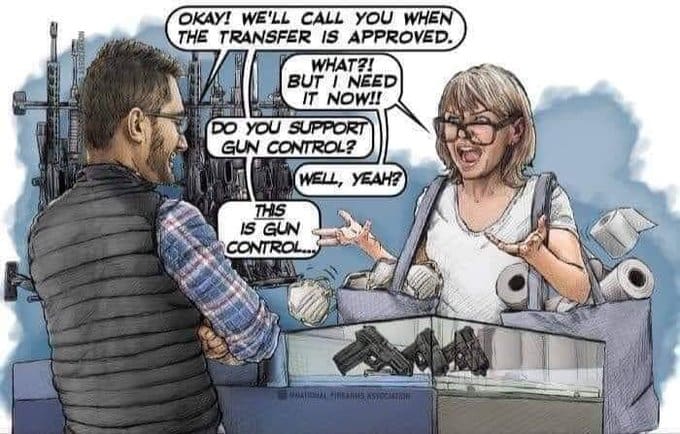The good news recently is that some states that initially closed gun stores have reversed those decisions. Delaware‘s John Carney, Jr. and Pennsylvania’s Tom Wolf — no friends of guns, they — have been persuaded that closing their state’s gun stores during a national emergency, when police departments are struggling to keep cops on the beat, is a bad idea.
Other governors have taken a hands-off approach. Texas left stay-at-home decisions to individual counties. That resulted in shuttered gun stores in Dallas, Fort Worth, Houston, San Antonio and Austin…until Attorney General Ken Paxton stepped in with a legal opinion making it clear that counties can’t close gun retailers under the state’s preemption law.
After the Los Angeles County sheriff began closing gun stores there, California’s Gavin Newsom punted when asked to decide, leaving open or close decisions up to individual counties.
That’s resulted in closed gun stores in L.A. County, while retailers can remain open in San Diego and Riverside counties. Gun rights orgs like the Firearms Policy Coalition, the Second Amendment Foundation and the NRA, among others, have sued the LA County Sheriff, Governor Newsom and now LA Mayor Eric Garcetti, to try to get the stores there back up and running.
And over the weekend, the Department of Homeland Security — in a move that enraged gun control advocates — has now designated the country’s gun makers, retailers and ranges as critical infrastructure, setting up potential fights with the jurisdictions that are still barring sales.
Speaking of Karens . . .
Meanwhile, tens of thousands of first-time gun buyers are purchasing their first firearms. As a New Yorker article yesterday made clear, a lot of those people are “first-time liberal buyers” who never thought they’d set foot in a gun store.
At noon, a woman in her sixties came in. She wore plastic gloves and had a scarf wrapped around her face, and she traced a wide arc around the only other non-employee in the store. “I’ve been doing this since the beginning of March,” she said, referring to her protective gear. “I don’t feel sick at all. I’m self-quarantining.” She left her house only for essential activities. This was one. “I’m buying a gun,” she said. “I can’t believe it.”
She went on, “My son was a little upset about it.” (He preferred his bow and arrow.) “I’m old and I live alone, and we don’t know if there’s going to be civil unrest. The world is not the same.”
Do tell.
These first-timers are seeing first-hand that buying a gun isn’t the oh-my-God-it’s-way-too-easy process that they’ve been told it is lo these many years. In fact, you can’t just press “enter” on your computer and have the big brown truck drop a handgun at your door. Imagine that.
The woman in the New Yorker article has the good luck to live in Oregon. She was able to walk out of Gorge Guns in Hood River with her brand new Keltec PMR-30.
If she lived in Washington and tried to buy a handgun through Miller Sports in White Salmon, only four miles away across the Columbia River, she’d have had to wait ten days before being allowed to take her new handgun home.
Besides the permission slips (Illinois’ FOID card, New Jersey’s Firearm Purchaser ID Card) in many states, the various background check systems have bogged down — or were shut down — under the buying volume the last two weeks. That’s resulted in significant delays in taking the guns home that buyers need now.
During the height of the surge, people were waiting hours if not days or even weeks to get a governmental all-clear.
You’d hope that the fence-sitters and former anti-gunners who’ve now been educated as to the regulatory maze Americans have to navigate in order to buy a self-defense tool in some states would have their minds changed about the never-ending push for more gun control laws in this country. You’d hope.
But few people have lost money betting on the short collective memory of the American electorate.
When the Wuhan Viral Pandemic of 2020 eventually recedes into the past, will voters have a newfound respect for their Second Amendment rights? Will they remember that feeling when they first heard about a national emergency declaration and made the local gun store their first stop?
Will the shock felt by Illinoisans who didn’t already have a FOID card — and therefore can’t legally buy a gun now at any price — make a difference in who they vote for in the future?
Will the Karen in the cartoon at the top of this post support different candidates as a result of what she had to go through and how long it took her to buy a firearm to protect her family?
Let us know how or if you think things will change for gun control in America in the comments below.
